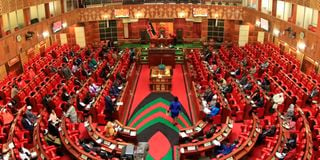Thrice rejected, MPs finally approve law to set up fund to fight poverty

Members of Parliament during a past session.
What you need to know:
- In the last Parliament, several stakeholders, including the Treasury and the State Department for Labour and Social Protection, opposed the enactment of the Bill.
- Mr Waluke’s Bill seeks to establish the authority tasked with coordinating national economic empowerment and poverty reduction agenda.
A parliamentary committee has approved a Bill that seeks to establish an exclusive fund to fight poverty in the country.
This is the third time that Sirisia MP John Waluke is seeking the approval of the House to enact the law after the National Assembly’s Finance and Planning Committee last year shot down the proposal, arguing that the Poverty Eradication Authority Bill, 2020 duplicates the services of other government agencies.
In rejecting the Bill, the committee then chaired by Homa Bay MP and now governor Gladys Wanga said the proposed law is counterproductive since the Treasury has established the Biashara Fund that merges all existing State-backed funds.
But on Thursday, the committee chaired by Molo MP Kuria Kimani said the enactment of the law will go a long way in assisting the government tackle poverty.
“We know that his Bill went through the second reading in the House but lapsed in the Senate. Unfortunately, we will start the entire process afresh. We will give the Bill a positive consideration given the work that Mr Waluke has put three unsuccessful times,” Mr Kimani said during the pre-publication scrutiny of the Bill.
Mr Waluke pleaded with the committee to approve the Bill that was first introduced in the 11th Parliament but was never approved.
“It is my appeal now that the 13th Parliament will see to it that it is finally done as a step towards creating a mechanism through which we can start effectively battling against the ravaging poverty in the country and help President William Ruto in his effort to raising standards of living through the bottom up economic approach,” Mr Waluke said.
Enactment of Bill
“The Poverty Eradication Commission, which was established in 1999 under Kenya gazette notice no. 2295 had so little legal powers until its term expired a few years ago and it was wound up.”
Mr Kuria said the State had established Uwezo Fund, the Women Enterprise Fund, the Youth Enterprise Fund, and Equalisation Fund to combat poverty but little has been achieved.
In the last Parliament, several stakeholders, including the Treasury and the State Department for Labour and Social Protection, opposed the enactment of the Bill.
“The committee, having considered the stakeholder’s comments, recommends to the House that the Poverty Eradication Authority Bill, 2020 be deleted and annulled in its entirety,” Ms Wanga said in a past report.
Mr Waluke’s Bill seeks to establish the authority tasked with coordinating national economic empowerment and poverty reduction agenda.
The Poverty Eradication Fund was to be established to help the authority in the fight against poverty in the country.
The Bill proposes the creation of an Authority which will be the successor of the defunct Poverty Eradication Commission.
The term of the last commission came to an end on May 26, 2015, as a fulfillment of an earlier recommendation by the National Assembly’s Budget and Appropriations Committee (BAC) report in 2013/14 financial year for the poverty eradication commission to be wound up.
Poverty rate
A June 2022 report on poverty by the Kenya National Bureau of Statistics (KNBS) shows that there were 19.1 million Kenyans who lived below the poverty line in 2021, a drop from 20.9 million in 2020, pointing to a recovery of the economy.
This means that 38.6 per cent of citizens live below the poverty line, whose total consumption per adult is less than Sh3,947 per month in rural areas and less than Sh7,193 per month in urban regions.
“In 2021, the overall poverty rate was 38.6 per cent compared to 36.1 per cent in 2015/16. However, this is a reduction compared to poverty rate of 42.9 percent in 2020. This indicates that 19.1 million individuals were poor in 2021,” said the Cabinet Secretary for National Treasury, Prof Njuguna Ndung’u.
Although the recovery of the economy saw those who lost jobs in 2020 return to gainful employment, the real wages, adjusted for inflation, will take longer to recover, analysts say.
According to the survey by Kenya National Bureau of Statistics, most poor people are in rural areas at 13.7 million compared to 5.4 persons living below the poverty line in urban areas such as Nairobi and Mombasa.
Around 15.1 million Kenyans cannot afford to put food on the table, with the 2021 poverty rates showing that a third of Kenyan households are food poor.
A person is considered food poor if their consumption is less than Sh2,331 per month in rural areas and Sh2,905 per month in urban areas.





